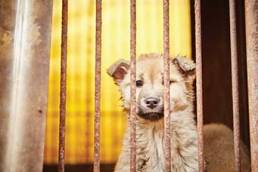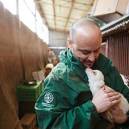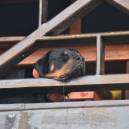Dog Meat Trade in Korea
In South Korea, dogs are sourced from farms where they are bred and raised for their meat, contributing to an industry estimated to be worth two billion USD each year.
By Claudia Bensimoun
“Whilst some small-scale dog farms exist in China and other countries in Asia, South Korea is the only country known to have established large intensive farming systems to supply the demand for dog meat. Data suggests that large-scale dog farming did not start in South Korea until the 1960s-1970s,” explains Lola Webber, Change For Animals Foundation (CFAF), Co-Founder, Programs Director, Bali.
The 2018 Winter Olympics in Pyeongchang, South Korea is three years away. Today South Korea’s policy on dog meat farming is under visible scrutiny. Animal rights activists from the Humane Society International (HSI) and Change For Animals Foundation (CFAF) are committed to ending the cruel practice of mass dog slaughter in South Korea. HSI and CFAF are part of the four founding members of the Asia Canine Protection Alliance (ACPA) that have been working with the governments of Thailand, Cambodia and Vietnam to raise awareness of both human and animal health, as well as animal welfare concerns associated with the dog meat trade.
“The farms are not registered, so it is not known exactly how many farms exist. But there are hundreds, if not thousands of farms in South Korea. These range from small farms like the ones we worked with up to farms that reportedly have over a thousand dogs,” says Adam Parascandola, HSI. “We started working with a farmer who grew blueberries, but also kept a small number of dogs for breeding and sale to the dog meat market. He expressed interest in getting out of the dog meat business, and we helped provide a home for the dogs so he could convert his farm entirely to blueberries. This happened back in January, and 23 dogs were brought to the U.S. for rehoming. At this time there is very little pet adoption in Korea, and there was not the capacity to place these dogs for adoption there.”
In January 2015, Parascandola and members of HSI worked together with a South Korean farmer to convert his farm from dog meat to blueberry farming. This was an important first step arranged by HSI to negotiate a change among South Korean dog meat farmers.










